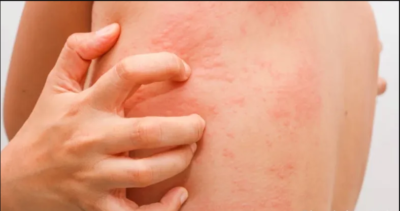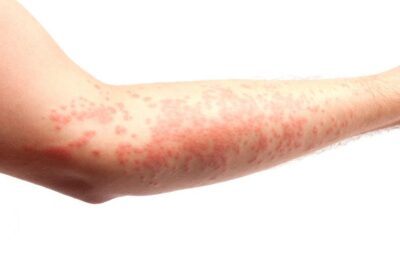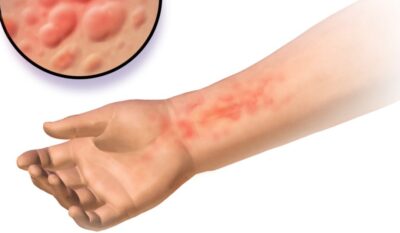 Urticaria, that is, hives, is a skin condition that occurs with symptoms such as itching, rash and redness in people. Hives are a common skin condition that can be seen in individuals of all ages. In people with hives, the condition can be brought under control with early treatment and diagnosis. There are effective and effective treatment methods for urticaria, which affects daily life negatively. Hives can occur due to many factors. Although the situations that trigger urticaria differ for each person, they are triggered for certain reasons.
Urticaria, that is, hives, is a skin condition that occurs with symptoms such as itching, rash and redness in people. Hives are a common skin condition that can be seen in individuals of all ages. In people with hives, the condition can be brought under control with early treatment and diagnosis. There are effective and effective treatment methods for urticaria, which affects daily life negatively. Hives can occur due to many factors. Although the situations that trigger urticaria differ for each person, they are triggered for certain reasons.
Contents
What is Urticaria (Hives)?
Hives, urticaria; It is a skin condition that manifests itself with swelling, redness, skin rash seen in the body due to different reasons. Urticaria should not be seen as a disease but as a symptom. Urticaria can be triggered in people for many reasons. It is necessary to identify the condition that caused the emergence of urticaria and to treat that disease. Hives are studied in two different phases. It is divided into acute and chronic urticaria. The splitting into two is due to the time period in which it takes effect. If urticaria is present for more than 6 weeks, it is examined under the title of chronic. In less lasting cases, it is considered acute. Apart from the duration issue, there are different issues that affect the acute and chronic condition.
Acute Urticaria: It often occurs due to infections, antibiotics and painkillers. They usually show improvement within a 3-week time frame.
Chronic Urticaria: It lasts longer than 6 weeks. In most cases, a diagnosis cannot be made as to why it occurs. Underlying causes are being investigated, but in less than 20% a cause can be identified.
What Causes Urticaria?
There are various factors in the emergence of hives. It is a reaction of our body’s immune cells responsible for allergies. It is more likely to manifest itself, especially when the immune system is weak. If we list the causes of urticaria;
- Infections, colds
- Side effects of drugs,
- Exercise and training, (physical urticaria)
- Cold or hot, (physical urticaria)
- Insect bites,
- Allergic conditions caused or triggered by rarely consumed foods,
- Thyroid diseases,
- Cancer diseases
- HIV
may be triggered by such reasons.
Urticaria may appear after contact with a hot or cold area and as a symptom of some diseases. Acute urticaria is usually self-limited and regressed within 3 weeks with treatment. Chronic urticaria can last for years. With the examination, the causes of chronic urticaria should be diagnosed and a treatment protocol should be established in accordance with it.
Urticaria (Hives) Symptoms
The symptoms of the disease are the same in most people. Often individuals themselves can describe urticaria. A doctor’s examination is essential when you see the following symptoms and these symptoms appear for a long time. Symptoms of urticaria;
- Itching in different parts of the skin,
- Shedding on the skin,
- Redness,
- Bloating,
- Dizziness,
- Shortness of breath,
- Swelling of the lips, eyes and tongue.
If people experience dizziness, shortness of breath, swelling in the lip-eye-tongue part, this is a symptom of urticaria accompanied by respiratory tract. This situation constitutes an emergency as it can go as far as being unable to breathe with throat and tongue swelling. In the presence of these findings, the nearest health institution should be consulted immediately. Such conditions are symptoms that warrant immediate action.
Urticaria (Hives) Diagnosis and Diagnosis
 The diagnosis and diagnosis of urticaria can be easily understood by the physician with a physical examination. After the physical diagnosis, the doctor may request various tests if they deem it necessary. Definitive diagnosis can be made with blood or allergic tests. The test is performed if the doctor feels necessary. Physical examination is sufficient for most urticaria diagnoses. During the physical examination, the patient’s diet, medical history, and history are generally listened to. Depending on all these, the cause of urticaria is usually easily determined.
The diagnosis and diagnosis of urticaria can be easily understood by the physician with a physical examination. After the physical diagnosis, the doctor may request various tests if they deem it necessary. Definitive diagnosis can be made with blood or allergic tests. The test is performed if the doctor feels necessary. Physical examination is sufficient for most urticaria diagnoses. During the physical examination, the patient’s diet, medical history, and history are generally listened to. Depending on all these, the cause of urticaria is usually easily determined.
Urticaria (Hives) Treatment
Your doctor will usually start your treatment with antihistamines. Using these drugs regularly will support the healing of hives in a short time. These types of drugs should be used under the doctor’s examination and control. In cases that do not respond to antihistamines, short-term cortisone treatments can be used.
Biological treatments can be applied in the treatment of chronic urticaria. These treatments are usually in the form of monthly vaccinations. With this drug, which is prescribed by a dermatologist, urticaria can be controlled in people with monthly vaccination treatment.
- Tips to Prevent Urticaria (Hives)
- If an underlying trigger has been identified, removing this factor may help prevent urticaria.
- Frequently Asked Questions and Answers About Urticaria (Hives)
- Below you can find the answers to frequently asked questions about the disease.
Is urticaria a disease?
In medicine, urticaria is considered a symptom, not a disease.
Is treatment necessary for urticaria?
In the case of acute urticaria, the patient usually recovers within 2-3 weeks, but treatment is given to suppress the symptoms. In severe acute urticaria, shortness of breath or chronic urticaria, treatment is absolutely necessary.
Does urticaria recur?
It can repeat. The underlying cause is often unclear, but in cases where the underlying cause has been identified, such as physical urticaria, it is possible to avoid these causes.
Are there many side effects of the drugs used in the treatment of urticaria?
As with every drug, drugs used in the treatment of urticaria also have side effects. Using it under the supervision of a physician minimizes these side effects. The most common side effects of antihistamine drugs are drowsiness and fatigue and are temporary.
Urticaria (Hives) Treatment Prices
 Doctor’s experience is very important in urticaria (hives) treatment prices. In addition, a number of diagnoses and tests may be required to diagnose the reasons why the patient has urticaria. Although there is not much drug treatment for urticaria today, suppressive drugs and vaccine treatments can be applied in chronic conditions. In such cases, issues such as which drugs are used and how long the vaccine is administered can also affect the price.
Doctor’s experience is very important in urticaria (hives) treatment prices. In addition, a number of diagnoses and tests may be required to diagnose the reasons why the patient has urticaria. Although there is not much drug treatment for urticaria today, suppressive drugs and vaccine treatments can be applied in chronic conditions. In such cases, issues such as which drugs are used and how long the vaccine is administered can also affect the price.
According to the rules of the Ministry of Health, it is not correct to give prices for health transactions on the internet pages. The prices for your treatment by experienced doctors with high patient satisfaction may also increase. For more information about urticaria (hives) treatment prices and examination fees, you can reach us from the information on our contact page and easily make an appointment. After making an appointment, the staff and doctors in our clinic will answer all your questions about urticaria (hives) treatment prices. We provide services with our specialists in the treatment of many diseases to make you healthier and feel happier.
You can get information about urticaria (hives) treatment prices by calling our polyclinic on +902122414624







